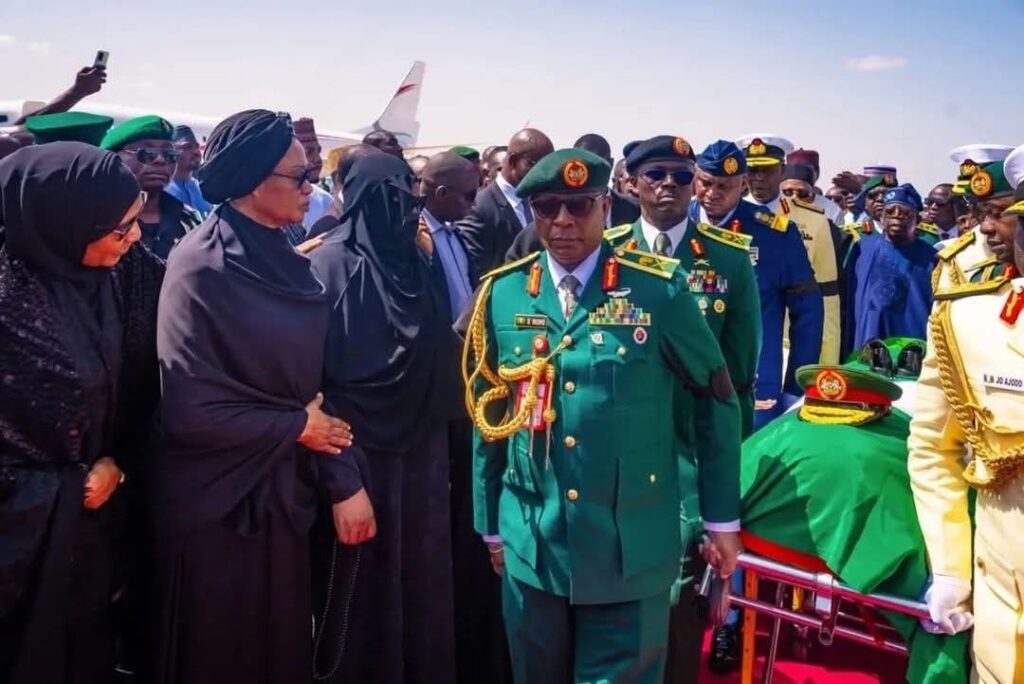Tinubu, Shettima, Former Vice President, Global Dignitaries Honour Buhari as He’s Laid to Rest in Daura.
By Raymond Enoch
A chapter of Nigeria’s history came to a solemn close on Tuesday, July 15, as former President Muhammadu Buhari was laid to rest in his hometown of Daura, Katsina State. The burial, marked by emotion, reverence, and high-level attendance, drew national and international dignitaries led by President Bola Ahmed Tinubu and Vice President Kashim Shettima.

President Buhari, who passed away in London at the age of 82, was interred at his private residence in Daura shortly before sunset. His final journey was a carefully choreographed procession steeped in Islamic rites, military tradition, and deep national mourning.
The late President’s body arrived Nigeria via Umaru Musa Yar’Adua International Airport, Katsina, Tuesday afternoon. Awaiting him was a delegation that read like a roll call of regional power—President Tinubu, VP Shettima, President Umaro Sissoco Embaló of Guinea-Bissau, Nigerien Prime Minister Ali Lamine Zeine, former Nigerien President Issoufou Mahamadou, former Nigerian Vice President Yemi Osinbajo, and a host of Nigerian governors and business leaders.
A visibly reflective President Tinubu joined the motorcade that transported Buhari’s remains from the airport to Daura in an emotional, hour-long convoy that wound through crowds of mourners who had lined the roads, waving flags and holding up portraits of the former leader.
On arrival at his residence, a solemn lying-in-state was conducted, allowing dignitaries and family members to pay their final respects. The Islamic funeral prayer, Salatul Janazah, was then led by Sheikh Salisu Rabiu, the Imam of the Daura Central Mosque.
At 5:50 p.m., in accordance with Islamic tradition, Muhammadu Buhari was laid to rest. The burial was accompanied by full military honours—reveille, a 21-gun salute, and the lowering of the national flag—symbolizing the passing of a statesman and former Commander-in-Chief.
Buhari’s funeral turned Daura into a temporary epicenter of African diplomacy, as visiting heads of state and envoys offered tributes to a man many described as “a steadying hand” in Nigeria’s turbulent democratic journey. President Embaló called him “a pillar of West African stability,” while Niger’s former President Mahamadou praised his “stoic nationalism.”
In his brief but heartfelt tribute, President Tinubu described Buhari as “a patriot whose sacrifices will be etched in the heart of our republic.” He added:
“President Buhari believed in Nigeria and in our ability to rise above our differences. Today, we honour a man who stood tall when it mattered most.”
The federal government has declared a seven-day period of national mourning. Flags will fly at half-mast, and a condolence delegation led by top cabinet ministers is expected to visit the Buhari family later this week.
In a country where legacies are often contested, Buhari’s departure has sparked a wave of public reflection—on his military discipline, anti-corruption crusade, and polarizing yet pivotal presidency.
Born in 1942 in Daura, Buhari served as Nigeria’s military Head of State from 1983 to 1985, and later as the democratically elected President from 2015 to 2023. His tenure, marked by economic challenges, anti-graft efforts, and complex security dynamics, left an indelible mark on Nigeria’s political landscape.
Today, the town he cherished has become his final resting place—and, for a moment, the beating heart of a grieving nation.








